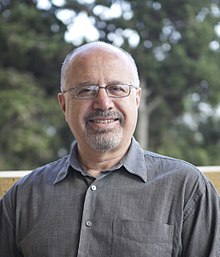Shibley Telhami
This article has multiple issues. Please help improve it or discuss these issues on the talk page. (Learn how and when to remove these messages)
|
Shibley Telhami | |
|---|---|
 | |
| Born | July 31, 1951 |
| Education | University of California at Berkeley (Ph.D.) |
| Occupation(s) | Anwar Sadat Professor for Peace and Development |
| Website | https://sadat.umd.edu/ |
Shibley Telhami is an American professor in the department of government and politics[1] at the University of Maryland, College Park,[2] and a nonresident senior fellow of the Center for Middle East Policy at the Brookings Institution.[3]
Life
[edit]Telhami was born into an Arab family in Israel but has lived his entire adult life in the United States.[4] He is fluent in Arabic, Hebrew, and English. He advised in one way or another every U.S. administration from George H. W. Bush to Barack Obama.[5]
Career
[edit]Telhami is a political scientist specializing in international relations, American foreign policy, and Middle Eastern politics with a particular focus on the role of public opinion. He is the author and editor of numerous books and academic articles and contributes to various periodicals and newspapers.[6][7][8]


Before coming to the University of Maryland, he taught at several universities, including Cornell University, the Ohio State University, the University of Southern California, Princeton University, Columbia University, Swarthmore College, and the University of California at Berkeley, where he received his doctorate in political science. In 2016, he established and assumed the directorship of the University of Maryland Critical Issues Poll, which probes American public opinion on domestic and foreign policy issues.[9]
Telhami has also been active in foreign policy. He has served as advisor to the U.S. Mission to the U.N. (1990–91), as advisor to former Congressman Lee H. Hamilton, and as a member of the U.S. delegation to the Trilateral U.S.-Israeli-Palestinian Anti-Incitement Committee, which was mandated by the Wye River Agreements. He also served on the Iraq Study Group as a member of the Strategic Environment Working Group. He has contributed to The Washington Post,[10] The New York Times,[11] and the Los Angeles Times[12] and regularly appears on national and international radio and television. He has served on the U.S. Advisory Group on Public Diplomacy for the Arab and Muslim World, which was appointed by the Department of State at Congress's request, and he co-drafted the report of their findings, Changing Minds, Winning Peace. He has also co-drafted several Council on Foreign Relations reports on U.S. public diplomacy, on the Arab-Israeli peace process, and on Persian Gulf security.
Telhami is a member of the Council on Foreign Relations[13] and has served on the board of the Education for Employment Foundation, several academic advisory boards, and has served on the board of Human Rights Watch (and as chair of the Advisory Committee of Human Rights Watch/Middle East). He has also served on the board of the United States Institute of Peace.[14] Telhami received the Distinguished International Service Award from the University of Maryland in 2002 and the Excellence in Public Service Award from the University System of Maryland Board of Regents in 2006. He was selected by the Carnegie Corporation of New York with the New York Times as one of the "Great Immigrants" for 2013. He also received the University of Maryland's Honors College 2014 Outstanding Faculty Award.
As part of the Anwar Sadat Chair for Peace and Development, Telhami established an international lecture series titled the Sadat Lecture for Peace.[15]
Bibliography
[edit]Telhami's book The Stakes: America and the Middle East (Westview Press, 2003; updated version, 2004) was selected by Foreign Affairs as one of the top five books on the Middle East in 2003. His other publications include Power and Leadership in International Bargaining: The Path to the Camp David Accords (1990);[16] International Organizations and Ethnic Conflict, ed. with Milton Esman (1995); Identity and Foreign Policy in the Middle East, ed. with Michael Barnett (2002);[17] The Sadat Lectures: Words and Images on Peace, 1997-2008,[18] and numerous articles on international politics and Middle Eastern affairs.
His latest books are The World Through Arab Eyes: Arab Public Opinion and the Reshaping of the Middle East (2013)[19] and The Peace Puzzle: America's Quest for Arab-Israeli Peace, 1989-2011 (2013).[20]
References
[edit]- ^ "Shibley Telhami". Department of Government and Politics. Retrieved 2018-02-27.
- ^ "Anwar Sadat Chair for Peace and Development". University of Maryland. Retrieved 2018-02-27.
- ^ "Shibley Telhami". Brookings Institution. Retrieved 2018-02-27.
- ^ "Conversations with History: Shibley Telhami". University of California Television. 6 November 2013. Retrieved 2018-02-27.
- ^ "Shibley Telhami". University of Maryland. Retrieved 2018-03-01.
- ^ "U.S. Views of Muslims and Islam". C-SPAN. Retrieved 2018-02-27.
- ^ "Middle East Scholar Shares Regional Response To Trump's Jerusalem Decision". All Things Considered. NPR. Retrieved 2018-02-27.
- ^ "Min Washington". Al-Jazeera. Retrieved 2018-02-27.
- ^ "Critical Issues Poll". University of Maryland. Retrieved 2018-02-27.
- ^ "How Trump changed Americans' view of Islam- for the better". The Washington Post's Monkey Cage. Retrieved 2018-03-01.
- ^ Telhami, Shibley; Kull, Steven (16 January 2012). "Preventing a Nuclear Iran, Peacefully". The New York Times. Retrieved 2018-03-01.
- ^ "A shift in Arab views of Iran". Los Angeles Times. 14 August 2010. Retrieved 2018-03-01.
- ^ "Shibley Telhami". Council on Foreign Relations. Retrieved 2011-01-07.
- ^ "Institute Welcomes New Board of Directors". United States Institute of Peace. Retrieved 2011-01-07.
- ^ "Sadat Lecture for Peace". University of Maryland. Retrieved 2011-01-07.
- ^ Power and Leadership in International Bargaining. Columbia University Press. September 1990. ISBN 9780231072144. Retrieved 2018-02-27.
- ^ "Identity and Foreign Policy in the Middle East". Cornell University Press. Retrieved 2018-02-27.
- ^ "The Sadat Lectures: Words and Images on Peace, 1997-2008". United States Institute of Peace. Retrieved 2018-02-27.
- ^ "The World Through Arab Eyes". Basic Books. Retrieved 2018-02-27.
- ^ "The Peace Puzzle". Cornell University Press. Retrieved 2018-02-27.
External links
[edit]- Israeli-Palestinian Peace Talk VI on YouTube by Leon Charney on The Leon Charney Report
- Appearances on C-SPAN
